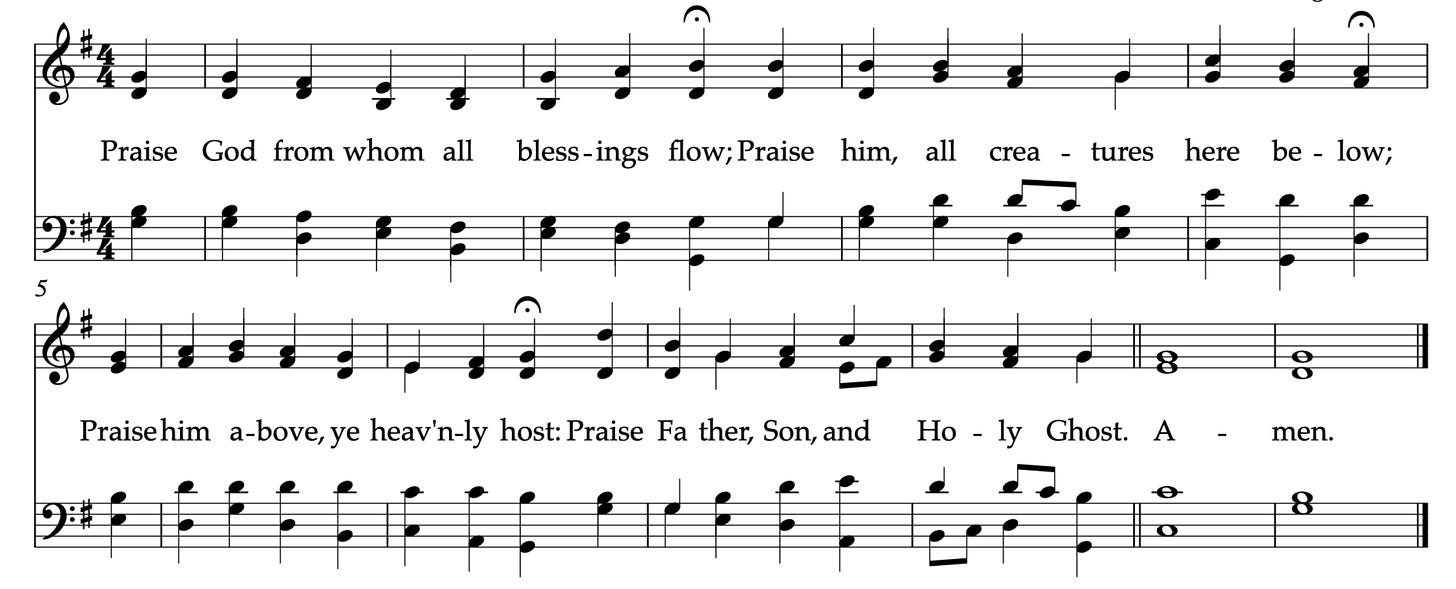Welcome, New Subscribers
My Substack email notifications were unusually high towards the end of last week. I soon discovered David Goodwin, president of the Association of Classical Christian Schools, wrote a kind recommendation for Musically Speaking. At about the same time, I received a similar recommendation from Anthony Esolen’s Word & Song Substack publication. As a result, I have seen a significant increase in subscribers. My thanks to these men for their kind words. To those of you who subscribed to this publication at their recommendation, thank you. Hopefully, you’ll be encouraged by the musical happenings I am a part of here in northeast Louisiana.
The Doxology: A Masterpiece of “Amplification & Compression”
Most Christians today would not quickly recognize the name James Montgomery, but we would probably know his most famous hymn text, “Angels from the Realms of Glory.” This Scottish poet and journalist lived from 1771–1854. He had a high standard of excellence for what constituted good poetry and hymnody. In 1825 he published a collection of 562 hymn texts, 103 of which he penned himself. At the beginning of this publication is an introductory essay in which Montgomery comments on hymnwriters of the day, praising a few in particular. I thought I’d pass along his comments about the Doxology that were of interest to me as I read them. Here Montgomery writes of Thomas Ken’s ending to his Morning, Evening, and Midnight Hymns that all end with the now-famous Doxology that he wrote in 1564:
The well-known doxology, “Praise God from whom all blessings flow,” etc. is a masterpiece at once of amplification and compression:—amplification, on the burthen, “Praise God,” repeated in each line;—compression, by exhibiting God as the object of praise in every view in which we can imagine praise due to Him:—praise, for all his blessings, yea, for “all blessings,” none coming from any other source, —praise, by every creature, specifically invoked, “here below,” and in heaven “above;”—praise, to Him in each of the characters wherein He has revealed Himself in his word—”Father, Son, and Holy Ghost.”1
Here James Montgomery praises Thomas Ken’s composition for its “exemplary plainness of speech, manly vigor of thought, and consecration of heart.” Perhaps James Montgomery has explained the Doxology’s staying power for the church.
Musical Settings of Thomas Ken’s Doxology
Several tune variations were paired with the Doxology.
The OLD HUNDREDTH
French musician Louis Bourgeois likely penned this famous tune in his work for the Genevan Psalter around 1551. The tune was first paired with Psalm 134. In later psalm collections, it would get paired with Psalm 100 and subsequently solidify its pairing to “All people that on earth do dwell.”
What has always been fascinating to me is that the rhythm here is not evened out like most of us grew up singing it. Instead, it has a rhythmic long/short quality that gives it some pep. Allow me to clarify. Most of us grew up singing this version below:
A fewer still may have sung this slightly more rhythmic version shown below:
The second version still uses more modern harmonization, but it has a little more rhythmic interest than the first one. It is not a matter of faster or slower, but rather groupings of beats. You should give this second version a try. I’m not saying you should retire the first one, but merely realize that many of these tunes we sing today are not presently offered in the same exact way they would have been initially sung. Their original versions had more life and rhythmic vitality than modern transcriptions reflect.
Tallis’ Canon
Another version of this text is sung to TALLIS’ CANON. This tune was written by Thomas Tallis around 1561 and was initially included in one of the nine tunes from Archbishop Matthew Parker’s Psalter as a setting of Psalm 67. Then in 1621, Thomas Ravenscroft reworked it into the version it is today. It can be sung in a four-part canon if desired. Below is the music and a recording:
The Tallis canon provides an excellent alternative musical option to sing the Doxology text. Additionally, Thomas Ken’s “Evening Hymn” is a beautiful arrangement of the canon, arranged by Kenneth Brown in 1962. It finishes with a glorious four-part canon on the doxology complete with a descant of voices that culminate in a glorious Amen.
Conclusion
Whether you sing this text to the OLD HUNDREDTH or TALLIS’ CANON, they both nicely serve Thomas Ken’s lyrics. May the church continue to sing it in worship and the little everyday musical moments.
Montgomery, James. The Christian Psalmist, Or, Hymns Selected and Original. United Kingdom: W. Collins, 1826, xviii–xix.








We sing this every day before we eat our dinner together around the table. We use the second version mentioned in this article. It's the beginning of our family worship time. We love this song